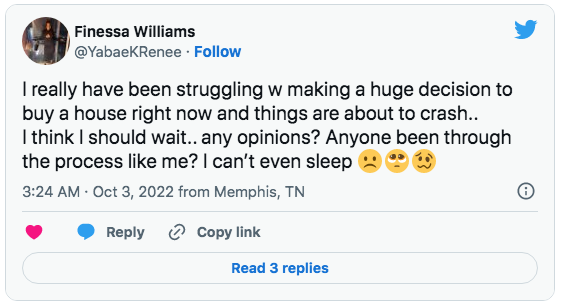If trying to time the housing market has you feeling overwhelmed, you’re not the only one. It never seems to be a good time to buy a house – markets seem to be red hot or freezing cold.

But you’re going to need somewhere to live, regardless of what’s going on in the economy. And builders are still building and working hard to find ways to get you into their homes, despite rapidly climbing mortgage rates that force buyers to either pay more each month for the house of their dreams or pay less for a house that feels like a compromise.
The solution to your problem is information – the better informed you are the better you’ll feel about buying a home in volatile economic times.
Here’s what to consider when buying in a difficult market.
How much can you afford to spend on a new house?
It seems obvious, but the first question you need to ask yourself is whether you can really afford to buy a house.
Livabl spoke to Nicolette Chapman, mortgage expert and vice president of sales for Zonda about what buyers need to know right now. She says affordability is the most significant thing first-time homebuyers should consider.
“The cost of living with inflation has made living expenses more challenging,” she said. “But people still need to concentrate on the number one factor, whether they have enough money.”
Once you decide to buy a house, you might feel the urge to immediately hop online and browse new home listings. But the first step in the homebuying process isn’t looking at new homes – it’s looking at your finances.
Consider your debt-to-income ratio and credit score. If those still need some work, spend some time chipping away at your debt and boosting your credit score. But don’t be embarrassed if your credit isn’t squeaky clean. Builders and mortgage companies are here to help you.
“A great mortgage company is going to have plans in place that are going to be able to do a run of the numbers,” Chapman says. “If we look at your credit and pay off your high-interest credit cards, your credit score will jump. At that point, we’ll be able to get you qualified in many situations. It’s attainable in a small amount of time.”
Don’t forget to factor inflation, repairs and utility costs into your budget, too. With costs of living rising across the world, budgets are becoming tighter for everyone. Be realistic with yourself, and don’t forget that paying for a home isn’t just about paying the mortgage.

The best time to buy a house is when you decide you’re ready. Image via Pexels.
You decide when it’s the right time to buy a new house
Here’s a secret that most Wall Street economists don’t want you to know – no one can predict how markets will change with 100 per cent accuracy. That makes timing the market impossible – buy what you can afford when you’re ready to buy.
Simple.
Buying in a complicated market sometimes means making compromises. Your budget and the supply of available housing might be at odds with each other – which means you may have to expand the boundaries of where you’re looking to buy and how long you’re willing to wait in order to find your perfect home.
Knowing how much you can afford is a game of numbers. But knowing when you’re ready to buy is less cut-and-dry. Here are a few reasons why buying a home might be a good idea:
- Your family is expanding and your two-bedroom apartment just isn’t cutting it.
- The cost of your rent is around the same as what you’d pay for a mortgage.
- You’re looking for long-term stability.
- You’re interested in building equity through homeownership.
- You’re not afraid of commitment and are willing to dedicate time and patience into the purchasing process.
There’s no mathematical formula to determine whether now is the right time to make a commitment – so don’t feel like you have to make a decision just because of FOMO. Rather than focusing on what your friends or the latest headlines are saying, assess your personal situation to decide whether it’s the right time to buy.
After all – it’s your house, your rules.
FOMO vs FOBATT
What on earth is FOMO?
It means ‘fear of missing out’ – and in the past, that fear dominated the housing market.
Buyers used to rush to purchase anything that hit the market out of fear that prices were accelerating. Today it’s a little different, and buyers are suffering from FOBATT – fear of buying at the top.
According to Tim Sullivan, a senior managing principal at Zonda, FOBATT is impeding home purchases, as buyers are spending more time waiting for the market to change than they are shopping for homes. The hope is that waiting months or years will mean scoring a better deal on a house, even though that’s not a guarantee.
The message has been heard loud and clear by builders and real estate professionals around the world.
“Buyers today are looking for a deal,” says Zonda’s chief economist Ali Wolf. “They are saying ‘I’ll buy today if something makes me feel good about purchasing.”
New home builders understand the FOBATT phenomenon. They are looking at their options and offering potential buyers incentives to buy now. Price drops and favourable mortgage arrangements are just a few tools at the builder’s disposal.
“They need to get consumers over the mental hurdles,” Wolf says. “We know that purchasing power has been lost greatly this year … that doesn’t mean people won’t buy a home, but what kind of compromises are they willing to make?”
Put your phone away and ask the experts
The internet is obsessed with personal finance, and everyone seems to have different advice. Spend your money here, don’t spend it there, make good investments – the list goes on. On top of that, there’s the ever-mysterious market, which is always “about to flip” but somehow never in your favour.
It’s no wonder big purchases are stress-inducing. Sometimes it’s easier to procrastinate making choices if the choices are making our stomachs churn.
Brandon Banman, a financial service representative at CIBC says fear of big purchases is common, but there’s still hope for anxiety-riddled buyers – and it starts with logging off social media.
“We get a lot of advice from the internet, and I’ve seen plenty of posts online trying to dissuade people from making big purchases,” he said. “But a lot of those posts come with very little context. Good advice is telling someone to think about whether they really need a $500 pair of shoes that they’ll never really wear anyways. Buying a house is completely different, and no one should be in a moral panic trying to justify how they want to put a roof over their head.”
According to Banman, the best thing you can do when looking to buy a house in a difficult market is to ask for professional advice.
“There is no bad time to ask for help,” he said. “Real estate is a big market that is full of professionals who can help you figure out what you can afford and where. Even if you’re just thinking about buying a house and have no idea where to start, a financial advisor or a realtor can help you get on the right track.”

If you’re getting overwhelmed by bad market news, get off social media and talk to an expert. Image via Pexels.
Don’t be afraid to buy a new house now
As mentioned before, there’s no real way to predict the future with 100 per cent accuracy. Which means no matter how anxious you are about the price of buying – it can always get more expensive.
That may not be the reassurance you’re looking for. Here’s a hypothetical scenario:
Your budget for a house is $800,000 but the average sold price in your desired area is $785,000. That’s below your budget, but you’d prefer to spend less. You decide to wait a few years, hoping that the average market price will go down. It has to eventually, right?
Fast forward a few years, and now the average sold price in the same neighbourhood is $950,000 – well over your budget. Now what?
According to Florida-based realtor Jim Woelkers, this is a situation that many find themselves in now that housing prices have been steadily increasing in the wake of the pandemic.
“This last year we saw buyers really struggle with how fast prices were rising,” he said. “Within a matter of weeks or months the price of a home could go up, or interest rates could go up.”
But fear of buying at the top can quickly turn into missing your window to enter the market entirely. Remember – you’re not playing the stock market, you’re investing in a home that is meant to serve you for a lifetime.
“If you can get in, get in,” Woelkers said. “Timing the market doesn’t work if you plan to live in your home for 10, 15 or 20 years. It’s just about getting your foot in the door when you can afford to do it.”
Buy new, buy quality
Interest in new construction homes for sale are trending upward nation-wide as the year goes on. One reason for the sudden increase in interest is the fact that there’s more new homes available – which means less chance of a bidding war for prospective buyers.
Inventory of new homes for sale has increased by 25% within the year, while the supply of pre-owned homes on the market remains relatively unchanged. This is great news for anyone who’s been battling it out on tight resale markets.
Aside from higher inventory, what else is good about buying new?
New construction homes are typically a little more expensive than pre-owned homes, and for good reason – most new construction homes are built with quality in mind, so buyers pay a little extra for energy-efficient appliances, high-quality building materials, modern finishes and home warranties.
It’s normal to want to shy away from a more expensive purchase in a difficult market. But builders aren’t oblivious to what’s been happening with the market, and they’re working to find ways to adapt.
According to Tim Sullivan, market conditions are pushing homebuilders to find a balance between marketing, quality and incentives in order to make new homes attainable for buyers who are feeling the pinch of inflation and rising costs of living.
“We know buyers aren’t giving up on the dream of homeownership,” he writes. “The interest is there, but how do we convince consumers that now is the right time to buy?”
The answer lies in incentives.
In a tight market, buyers want to get the most out of their purchasing power. They’re looking for two things: quality and affordability – and that’s exactly what new construction offers.
In order to sell the homes they build, builders can offer incentives or discounts that you just won’t find in a resale home – and they could save you a bit of cash in the long run. Whether it’s free internet for a year, capped interest rates or a flat-out discount on the price of your home, it’s worth looking into.
Incentives will vary by developer, so be sure to shop around and ask builders what they’re willing to offer.





